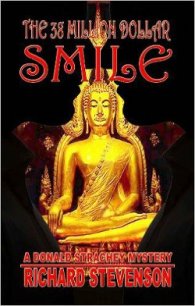Congo - Crichton Michael (книги регистрация онлайн бесплатно .TXT) 📗
Some abstract corner of Elliot’s mind considered this discovery tremendously exciting, while at the same time he shared the fear of the others around him. Crouched behind the dense foliage they held their breath and watched the gorillas feed on the opposite hillside. Although the gorillas seemed peaceful, the humans watching them felt a tension approaching panic at being so close to such great numbers of them. Finally, at Munro's signal, they slipped back down the trail, and returned to the camp.
The porters were digging graves for Akari and Mulewe in camp. It was a grim reminder of their jeopardy as they discussed their alternatives. Munro said to Elliot, “They don’t seem to be aggressive during the day.”
“No,” Elliot said. “Their behavior looks quite typical- if anything,. it’s more sluggish than that of ordinary gorillas in daytime. Probably most of the males are sleeping during the day.”
“How many animals on the hillside are males?” Munro asked. They had already concluded that only male animals participated in the attacks; Munro was asking for odds.
Elliot said, “Most studies have found that adult males constitute fifteen percent of gorilla groupings. And most studies show that isolated observations underestimate troop size by twenty-five percent. There are more animals than you see at any given moment.”
The arithmetic was disheartening. They had counted three hundred gorillas on the hillside, which meant there were probably four hundred, of which 15 percent were males. That meant that there were sixty attacking animals-and only nine in their defending group.
“Hard,” Munro said, shaking his head.
Amy had one solution. She signed, Go now.
Ross asked what she said and Elliot told her, “She wants to leave. I think she’s right.”
“Don’t be ridiculous,” Ross said. “We haven’t found the diamonds. We can’t leave now.”
Go now, Amy signed again.
They looked at Munro. Somehow the group had decided that Munro would make the decision of what to do next. “I want the diamonds as much as anyone,” he said. “But they won’t be much use to us if we’re dead. We have no choice. We must leave if we can.”
Ross swore, in florid Texan style.
Elliot said to Munro, “What do you mean, if we can?”
“I mean,” Munro said, “that they may not let us leave.”
2. Departure
FOLLOWING MUNRO’S INSTRUCTIONS, THEY carried only minimal supplies of food and ammunition. They left everything else-the tents, the perimeter defenses, the communications equipment, everything, in the sunlit clearing at midday.
Munro glanced back over his shoulder and hoped he was doing the right thing. In the 1960s, the Congo mercenaries had had an ironic rule: “Don’t leave home.” It had multiple meanings, including the obvious one that none of them should ever have come to the Congo in the first place. It also meant that once established in a fortified camp or colonial town you were unwise to step out into the surrounding jungle, whatever the provocation. Several of Munro’s friends had bought it in the jungle because they had foolishly left home. The news would come to them: “Digger bought it last week outside Stanleyville.” “Outside? Why’d he leave home?”
Munro was leading the expedition outside now, and home was the little silver camp with its perimeter defense behind them. Back in that camp, they were sitting ducks for the attacking gorillas. The mercenaries had had something to say about that, too: “Better a sitting duck than a dead duck.”
As they marched through the rain forest, Munro was painfully aware of the single-file column strung out behind him, the least defensible formation. He watched the jungle foliage move in as their path narrowed. He did not remember this track being so narrow when they had come to the city. Now they were hemmed in by close ferns and spreading palms.
The gorillas might be only a few feet away, concealed in the dense foliage, and they wouldn’t know it until it was too late.
They walked on.
Munro thought if they could reach the eastern slopes of Mukenko, they would be all right. The gray gorillas were localized near the city, and would not follow them far. One or two hours walking, and they would be beyond danger.
He checked his watch: they had been gone ten minutes.
And then he heard the sighing sound. It seemed to come from all directions. He saw the foliage moving before him, shifting as if blown by a wind. Only there was no wind. He heard the sighing grow louder.
The column halted at the edge of a ravine, which followed a streambed past sloping jungle walls on both sides. It was the perfect spot for an ambush. Along the line he heard the safeties click on the machine guns. Kahega came up. “Captain, what do we do?”
Munro watched the foliage move,, and heard the sighing. He could only guess at the numbers concealed in the bush. Twenty? Thirty? Too many, in any case.
Kahega pointed up the hillside to a track that ran above the ravine. “Go up there?”
For a long time, Munro did not answer. Finally, he said, “No, not up there.”
“Then where, Captain?”
“Back,” Munro said. “We go back.”
When they turned away from the ravine, the sighing faded and the foliage ceased its movement. When he looked back over his shoulder for a last glimpse, the ravine appeared an ordinary passage in the jungle, without threat of any kind. But Munro knew the truth. They could not leave.
3. Return
ELLIOT’S IDEA CAME IN A FLASH OF INSIGHT. “IN the middle of the camp,” he later related, “I was looking at Amy signing to Kahega. Amy was asking him for a drink, but Kahega didn’t know Ameslan, and he kept shrugging helplessly. It occurred to me that the linguistic skill of the gray gorillas was both their great advantage and their Achilles’ heel.”
Elliot proposed to capture a single gray gorilla, learn its language, and use that language to establish communication with the other animals. Under normal circumstances it would take several months to learn a new ape language, but Elliot thought he could do it in a matter of hours.
Seamans was already at work on the gray-gorilla verbalizations; all he needed was further input. But Elliot had decided that the gray gorillas employed a combination of spoken sounds and sign language. And the sign language would be easy to work out.
Back at Berkeley, Seamans had developed a computer program called APE, for animal pattern explanation. APE was capable of observing Amy and assigning meanings to her signs. Since the APE program utilized declassified army software subroutines for code-breaking, it was capable of identifying new signs, and translating these as well. Although APE was intended to work with Amy in ASL, there was no reason why it would not work with an entirely new language.
If they could forge satellite links from the Congo to Houston to Berkeley, they could feed video data from a captive animal directly into the APE program. And APE promised a speed of translation far beyond the capacity of any human observer. (The army software was designed to break enemy codes in minutes.)
Elliot and Ross were convinced it would work; Munro was
not. He made some disparaging comments about interrogating prisoners of war. “What do you intend to do,” he said, “torture the animal?”
“We will employ situational stress,” Elliot said, “to elicit language usage.” He was laying out test materials on the ground: a banana, a bowl of water, a piece of candy, a stick, a succulent vine, stone paddles. “We’ll scare the hell out of her if we have to.”
“Her?”
“Of course,” Elliot said, loading the Thoralen dart gun. “Her.’’


![[Magazine 1968-012] - The Million Monsters Affair - Davis Robert Hart (серия книг .txt) 📗](/uploads/posts/books/56864/56864.jpg)

